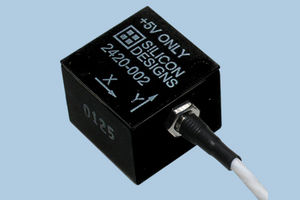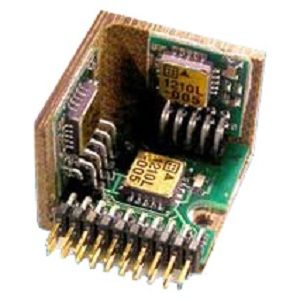
Single-axis accelerometer 2266 seriesMEMSwith analog output
Add to favorites
Compare this product
Characteristics
- Number of axes
- single-axis
- Technology
- MEMS
- Other characteristics
- with analog output
- Acceleration range
Max.: 3,923 m/s²
(12,871 ft/s²)Min.: 20 m/s²
(66 ft/s²)- Frequency
Max.: 2,000 Hz
Min.: 0 Hz
Description
Silicon Designs model 2266 is a high-precision accelerometer with simple 4-wire snap-in removable connector, allowing users added ability to exchange, move, reposition, and replace accelerometers within a test setup for greater flexibility, convenience and cost savings. Units are available for June 2012 delivery.
The model 2266 is expressly tailored for zero-to-medium frequency applications and offers integral amplification and high-drive, low impedance buffering. The accelerometer produces two analog voltage outputs and supports single ended and differential modes. Signal outputs are fully differential about a 2.5V common mode voltage. Sensitivity is independent from the 8-32V supply voltage. At zero acceleration, output differential voltage is nominally 0 VDC; at full scale acceleration, output differential voltage is ±4 VDC. Sensors feature on-board regulation and an internal voltage reference which eliminates precision power supply requirements. The sensor is relatively insensitive to temperature changes and thermal gradients. Within standard range, most accelerometers continue to operate after sustained exposures up to 10K g shock and temperatures above +200°C.
The model 2266 will drive more than 100 meters of cable, with flexibility that allows them to be used within a wider variety of applications, including wind turbines (sensors can be switched out without unwinding cable); flutter testing (entire aircraft can be wired, though sensors placed where needed); train testing; suspension testing; road tests; general drivetrain testing; automotive and aerospace NVH; and in-laboratory testing, particularly where requirements necessitate frequent cable replacement.
Catalogs
No catalogs are available for this product.
See all of Silicon Designs‘s catalogs*Prices are pre-tax. They exclude delivery charges and customs duties and do not include additional charges for installation or activation options. Prices are indicative only and may vary by country, with changes to the cost of raw materials and exchange rates.




